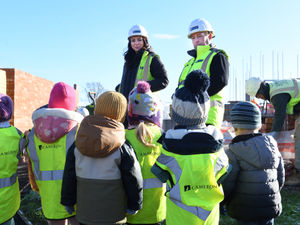Want to talk about your child's career plans? Give them a hearty meal first
Think it's time to have that all-important heart-to-heart with your children about what they want to do when they grow up? Just make sure it's not on an empty stomach.
A new charity-funded project is working with schools across the West Midlands to get teenagers to help teenagers prepare for their futures.
And according to the Talking Futures project, the first rule of helping teenagers take their first steps to carving out their career path is to make sure they have eaten first.
A survey carried out by the project found that 55 per cent of parents in the West Midlands found it was essential to make sure their children had eaten before embarking on a conversation about the future.
Talking Futures, funded by Lord Sainsbury's Gatsby Foundation, has been set up to help provide support for teenagers in planning their careers. It has produced a website for parents aimed at helping them support children in deciding what they want to do. A panel of psychologists have put together a list of dos and don'ts for parents when broaching the subject with youngsters.
Five schools across the West Midlands, including Idsall School in Shifnal, have also been involved the project.
Lucy Kendall, careers adviser at Idsall, says it is important parents are confident when discussing careers with their children.
"This is especially true this year when students have less face-to-face contact with teachers and other careers activities due to Covid," she says.
"The Talking Futures resources provide many different activities to help to start discussions, and make these vital conversations a two-way process between parents and their children.”
According to Talking Futures, in the current economic climate and with the rising levels of unemployment, helping parents support their children through the different education and careers options is more important than ever. What’s more, those options have changed since many parents grew up, with new options such as T-Levels – a practical-based alternative to A-levels – adding to the confusion.
Rebecca McKelvey, one of the panel members, says one of the mistakes many parents make is feeling their children need to have a clear plan at the end of the conversation.
“As a parent you may feel you have to have a specific outcome or answer after speaking to your child, but you don’t need to have it all worked out," she says.
"Making your teen's thoughts and skills feel valued is key to success so starting a conversation by asking them about their passions, skills and what subjects they love central to a conversation is fundamental to making them feel heard and a positive conversation.”
Michelle Rea of Talking Futures says parents play a vital role in supporting their children’s education and career choices.
"Covid and Brexit have led to a rapidly evolving economy and with the huge changes to the job market over the last 10 years it is unsurprising that some parents find it hard to have conversations about education and careers, as it is hard to keep pace," she says.
"It can be overwhelming but help is available to find your way through and it’s easier than you might think.
"As the number one influencer on their child’s decisions, parents know what works to get them talking and with some simple support and guidance, we can ensure every parent feels confident to help guide their child’s choices.”
John Coleman, a well-known expert on adolescent psychology, Prof Geraint Rees of the University of Central London, and clinical psychologist Dr Genevieve von Lob also sit on the panel. They suggest that instead of having formal, serious-sounding discussions about career options, that the conversations should be brief and regular. Asking open-ended questions, allowing youngsters to express themselves, is also a good idea.
According to the panel, there’s much that parents are doing right. The survey of 2,000 parents across the West Midlands found that 62 per cent try to sit side by side on the sofa when having their career conversations, which can help encourage a child to open up. Many also opted for a change of scene, with 84 per cent finding that taking a walk outdoors leads to more positive conversations.
The survey reveals that while most parents of 11-18 year olds feel their child would listen to their opinion first when it comes to education and career choices – ahead of their child’s teachers or friends – one in five find talking to their children about education and careers hard. And a similar number are frustrated that when they do start a conversation it leaves them no further forward than they were before.
The experts offer the following tips:
*Research the options available: things have probably changed since you were at school or college. Find out more about post-16 and post-18 options today.
*Talk to your child’s school or college: over the year, the school or college will run events and activities, and may invite you to attend some of them. Even if they are not specifically about careers they can be a good opportunity to discuss your child’s options.
*Talk regularly about your child’s future: make careers, aspirations and interests part of everyday conversation, not just a topic for times when they are making decisions.
*Share your own experiences: whether you currently are in work, you are a full-time parent, you are seeking work or you are retraining, the choices you made and your skills will be useful for your child to know.
*Let your child lead the way: listen to their opinions about their options, and ask questions to help them make decisions, so that your conversations are positive and constructive.
*Encourage your child to do research: there’s plenty of information available online and from the school or college, who may recommend particular sources of information. If they’re interested in a particular career, you could suggest they explore the education and training they’ll need to be successful. Find out more.
*The Talking Futures website offers hints, tips and tools for youngsters to help choose their careers. Careers advice has come on along way from the days of the old Signpost card-index boxes.
For more information see talkingfutures.org.uk





